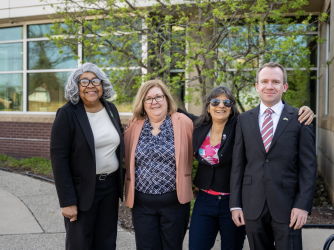Table of Contents
Divesting from Milton Friedman
Over 100 University of Chicago faculty members are pressuring the University of Chicago to divest from its commitment to a new Milton Friedman Institute—"a center for path-breaking research in economics to build upon the strengths of economists throughout the University and to honor the contributions of Milton Friedman."
In a group letter, these faculty members express that they are "disturbed by the ideological and disciplinary preference implied by the University's massive support for the economic and political doctrines that have extended from Friedman's work." In particular, they argue, "When the University of Chicago invests so heavily in culturally and politically conservative thought we wonder about its commitment to strong intellectual diversity in the tradition of the Kalven Report."
The Kalven Report expresses the University of Chicago's commitment to neutrality on the issues of the day. Although in practice the Kalven Report tends to be trotted out, in my experience, unequally—most often when the university administration does not want to go along with the agenda of some activist group on campus—its principles are stirring and have been duplicated at universities around the country.
In light of the Kalven Report principles, the University of Chicago even famously chose not to divest from companies doing business in South Africa. In 2006, the university also chose not to divest from Sudan. How much worse is the tradition of Milton Friedman's economic research?
The upset faculty members have no chance in the world of winning on the principle that the new center, being so enmeshed in capitalism of all things, will be unpopular to some:
Many colleagues are distressed by the notoriety of the Chicago School of Economics, especially throughout much of the global south, where they have often to defend the University's reputation in the face of its negative image.
The faculty members are also working the angle that by promoting the Friedman Institute, the university is somehow violating the spirit of academic neutrality:
Consider, for instance, the following passage in the Proposal to Establish the Milton Friedman Institute, which construes a certain orthodoxy as the starting point for any discussion: "Following Friedman's lead, the design and evaluation of economic policy requires analyses that respect the incentives of individuals and the essential role of markets in allocating goods and services. As Friedman and others continually demonstrated, design of public policy without regard to market alternatives has adverse social consequences."
If this is enough to establish that a program mandates an orthodoxy, I fear for the Center for Gender Studies, the Center for the Study of Race, Politics, and Culture, the Core curriculum courses on "Colonizations"—and even the History Department, which explicitly advertises an unequal commitment to "interdisciplinary and comparative history" versus other kinds of history. I am even more fearful for the entire School of Social Service Administration, which declares in its mission statement that "In most cases, alleviating distress requires an emphasis on helping individuals and families acquire the resources, skills, and authority to secure adequate solutions to their own problems." A witch-hunt for orthodoxy-like statements only leads to a lot of drownings of false witches.
I wonder if this foray is really just a matter of money. I really do not think the dissenting faculty members think they can win divestment from Milton Friedman, but I think they do believe they are playing for more investment for their own politicized causes. In one of the concluding statements in the letter, the faculty members state that "the University now has the opportunity to provide roughly equivalent resources for critical scholarly work that seeks out alternatives ..."
It is true: unequal funding reflects institutional priorities. But that's a far cry from establishing an institutional orthodoxy. Emphasizing studies in one perspective over another is an important way for graduate departments and entire graduate programs to compete with one another. The real problem is when students or scholars are required to, for instance, demonstrate personal commitment to a highly politicized agenda of "social justice" or certain moral "dispositions"—as at Columbia Teachers College and elsewhere.
Recent Articles
FIRE’s award-winning Newsdesk covers the free speech news you need to stay informed.

VICTORY: Michigan town declares Sept. 6 ‘First Amendment Day’ after FIRE sues its mayor for shouting down residents

USC canceling valedictorian’s commencement speech looks like calculated censorship

Back into the FIRE: Hasen’s response to FIRE and Rohde: Don’t read the press clause out of the Constitution — First Amendment News 420
